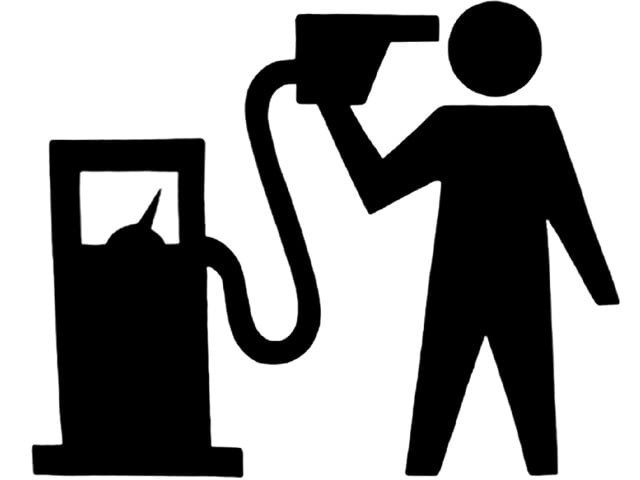Petrol price hike: Gilani to consider subsidy
OGRA increases prices of petroleum products by 10 to 13 per cent, criticism pours in. New CNG price announced.

Prime Minister Yusuf Raza Gilani on Friday promised to consider subsidising fuel prices after the hike was challenged in Lahore High Court (LHC) earlier in the day.
Addressing the Senate session, Gilani said that Pakistan's taxes on petroleum products are among the lowest in the world.
Earlier, criticism pored in from all sides after the Oil and Gas Regulatory Authority increased the prices of petroleum products by 10 to 13 per cent.The Muttahida Qaumi Movement (MQM) rejected the hike in petroleum prices saying that the move is unacceptable.
Senior MQM leader Dr Farooq Sattar informed the federal finance minister about his party's concerns over the hike. The MQM has summoned a meeting of its coordination committees in Karachi and London to discuss the petrol price hike.
Moreover, the party denounced the latest increase as "sheer injustice" and urged the government to revoke the raise.
"The people of Pakistan are already under the burden of high prices and the government's decision to once again increase fuel prices will put further pressure on the people," the party said in a statement.
Pakistan Muslim League-Nawaz (PML-N) leader Nawaz Sharif on Friday also rejected the new petrol prices and demanded a withdrawal.
According to a press release, Sharif blamed the government for failing to control corruption. He said that the rise in petrol prices will create a new burden on the poorer segments of the society.
The PML-N leader warned the government not to test the patience of the people. He also said that the petrol bomb on the masses will cause more inflation and increase the misery of the people.
"The government should curb corruption and cut its own expenditures to raise revenues instead of creating problems for the poor people," party spokesman Siddiqul Farooq told Reuters.
CNG price increased, decreased
The All Pakistan Compressed Natural Gas Association announced new prices of Compressed Natural Gas (CNG). The price of the commodity has been increased Punjab and Sindh, and decreased in Balochistan and Khyber-Pakhtunkhwa.
The new price of CNG in Punjab and Sindh has been increased by two rupees and thirty-three paisas, and is now Rs55.78.
The association’s president stated that the price was increased as a result of the high cost of production.
In Balochistan and Khyber-Pakhutnkhwa the price of the commodity has been decreased by thirty paisas.
Updated from print edition (below)
Govt decides on up to 13% increase in oil prices
In a decision made in the early hours of Friday morning, the government decided to increase oil prices by between nine per cent and 13 per cent for the month of April.
“The government has decided an increase of up to 13 per cent,” the Finance Minister Abdul Hafeez Sheikh told The Express Tribune.
Petrol prices are scheduled to go up by Rs6.90 per litre, or 9 per cent, to Rs83.48 per litre. High Speed Diesel prices are expected to go up by Rs10.67 per litre, or 13.2 per cent, to Rs93.08 per litre.
As The Express Tribune went to press, the notification for increased oil prices had not gone up on the website of the Oil and Gas Regulatory Authority.
The decision comes in the wake of concerns that the government would not increase oil prices after coming under heavy political pressure from the opposition as well as its own coalition allies, particularly the Muttahida Qaumi Movement (MQM).
“The prime minister has directed the finance ministry a mechanism to provide relief to the end consumer but the government had to increase oil prices,” said Finance Secretary Waqar Masood, referring to the populist pressure on the government to keep oil prices down.
In the wake of a surge in global oil prices, the government has been absorbing the increase through lower petroleum taxes, which is denting its revenue targets. The government has already taken a Rs21 billion hit in revenue collection as a result of the decision to freeze oil prices from December to February and only partially pass them on in March. The total financial impact will come to around Rs37 billion or 0.2 per cent of the total size of the economy.
The government has set a target of Rs110 billion in revenues from petroleum taxes but due to its inability to apply a consistent rate, it has only collected Rs34 billion in six months.
Last month, the government increased the petroleum prices by ten per cent but later halved the increase within five days, owing to intense pressure from the MQM.
In recent months, the government has been considering launching targeted subsidies for the poorest segments of society to shield itself from the criticism that it does not protect the most economically vulnerable citizens. This approach would likely be less costly than the current approach of controlling prices through varying tax rates.
“The approach is that instead of giving general subsidies to the people, the government would rather give targeted subsidies, and will also take all possible efforts to ensure that these are not abused by the wealthy people,” said the finance minister earlier this month.
Published in The Express Tribune, April 1st, 2011.



















COMMENTS
Comments are moderated and generally will be posted if they are on-topic and not abusive.
For more information, please see our Comments FAQ